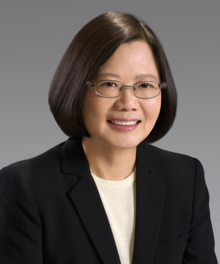
Back Tsai Ing-wen Afrikaans Tsai Ing-wen AMI تساي إنغ ون Arabic تساى انج ون ARZ Tsai Ing-wen AST Tsay İnven Azerbaijani تسای اینگ ون AZB Tsai Ing-wen BCL Цай Инуън Bulgarian Tsai Ing-wen Breton
Tsai Ing-wen | |
|---|---|
蔡英文 | |
 Official portrait, 2016 | |
| 7th President of the Republic of China | |
| In office 20 May 2016 – 20 May 2024 | |
| Premier | |
| Vice President | Chen Chien-jen Lai Ching-te |
| Preceded by | Ma Ying-jeou |
| Succeeded by | Lai Ching-te |
| 13th, 15th and 17th Chairwoman of the Democratic Progressive Party | |
| In office 20 May 2020 – 26 November 2022 | |
| Secretary General | Lin Hsi-yao |
| Preceded by | Cho Jung-tai |
| Succeeded by | Chen Chi-mai (acting) |
| In office 28 May 2014 – 24 November 2018 | |
| Secretary General | Joseph Wu Hung Yao-fu |
| Preceded by | Su Tseng-chang |
| Succeeded by | Lin Yu-chang (acting) |
| In office 20 May 2008 – 29 February 2012[a] | |
| Secretary General | See list |
| Preceded by | Frank Hsieh (acting) |
| Succeeded by | Kiku Chen Chu (acting) |
| 26th Vice Premier of the Republic of China | |
| In office 25 January 2006 – 21 May 2007 | |
| Premier | Su Tseng-chang |
| Preceded by | Wu Rong-i |
| Succeeded by | Chiou I-jen |
| Member of the Legislative Yuan | |
| In office 1 February 2005 – 24 January 2006 | |
| Succeeded by | Wu Ming-ming |
| Constituency | Party-list (DPP) |
| 6th Minister of the Mainland Affairs Council | |
| In office 20 May 2000 – 20 May 2004 | |
| Premier | Tang Fei Chang Chun-hsiung Yu Shyi-kun |
| Deputy | Chen Ming-tong |
| Preceded by | Su Chi |
| Succeeded by | Joseph Wu |
| Personal details | |
| Born | 31 August 1956 Zhongshan District, Taipei, Taiwan |
| Political party | Democratic Progressive (since 2004) |
| Education | National Taiwan University (LLB) Cornell University (LLM) London School of Economics (PhD) |
| Signature | |
| Scientific career | |
| Fields | Law and economics |
| Thesis | Unfair trade practices and safeguard actions (1983) |
| Doctoral advisor | Michael Elliott |
Tsai Ing-wen (Chinese: 蔡英文; born 31 August 1956) is a Taiwanese retired politician who served as the 7th president of the Republic of China (Taiwan) from 2016 to 2024, and was the first woman to hold that position.[1] A member of the Democratic Progressive Party (DPP), she intermittently served as chair of the DPP from 2008 to 2012, 2014 to 2018, and 2020 to 2022.[2]
Tsai was born and raised in Taipei and studied law and international trade, and later became a law professor at Soochow University School of Law and National Chengchi University after earning a LL.B. from National Taiwan University and a LL.M. from Cornell Law School. She later studied law at the London School of Economics and was awarded a Ph.D. In 1993, as an independent (without party affiliation), she was appointed to a series of governmental positions, including trade negotiator for WTO affairs, by the then ruling party Kuomintang (KMT) and was one of the chief drafters of the special state-to-state relations doctrine under the President Lee Teng-hui.[2]
During the first term of Chen Shui-bian's presidency, Tsai served as Minister of the Mainland Affairs Council. She joined the DPP in 2004 and served briefly as a DPP-nominated at-large member of the Legislative Yuan, and was then appointed as Vice Premier under Premier Su Tseng-chang until the cabinet's mass resignation in 2007. Following the DPP's defeat in the presidential election in 2008, she was elected as party chair of the DPP, but she resigned when the party lost the presidential election in 2012.[2]
Tsai ran for New Taipei City mayorship in the 2010 municipal elections but was defeated by the KMT candidate, Eric Chu. In April 2011, Tsai became the first woman to be nominated by a major party as a presidential candidate in the history of Taiwan after defeating her former superior, Su Tseng-chang, in the DPP's primary election by a slight margin.[3] In the 2012 Taiwanese presidential election, she was defeated by the then-president Ma Ying-jeou, but she won her first term of presidency in the 2016 presidential election by a landslide in a rematch against Eric Chu. In the 2020 presidential election, she was re-elected as president after winning the election against Han Kuo-yu.[4] Her presidency is succeeded by Lai Ching-te of the DPP on 20 May 2024. Tsai is the second president from the DPP, and also the first popularly elected president to have never served as the Mayor of Taipei.
| Tsai Ing-wen | |||||||||||||||||||||||||||||||||||||||
|---|---|---|---|---|---|---|---|---|---|---|---|---|---|---|---|---|---|---|---|---|---|---|---|---|---|---|---|---|---|---|---|---|---|---|---|---|---|---|---|
"Tsai Ing-wen" in Chinese characters | |||||||||||||||||||||||||||||||||||||||
| Traditional Chinese | 蔡英文 | ||||||||||||||||||||||||||||||||||||||
| Simplified Chinese | 蔡英文 | ||||||||||||||||||||||||||||||||||||||
| |||||||||||||||||||||||||||||||||||||||
Cite error: There are <ref group=lower-alpha> tags or {{efn}} templates on this page, but the references will not show without a {{reflist|group=lower-alpha}} template or {{notelist}} template (see the help page).
- ^ "Inaugural address of ROC 15th-term President Tsai Ing-wen". 20 May 2020. Archived from the original on 18 December 2021. Retrieved 10 October 2021.
- ^ a b c "President Tsai". Office of the President Republic of China. Taiwan. Archived from the original on 31 March 2018. Retrieved 1 January 2022.
- ^ Sui, Cindy (27 April 2011). "Taiwan's first female presidential candidate picked". BBC. Archived from the original on 3 December 2017. Retrieved 2 January 2015.
- ^ Feng, Emily (11 January 2020). "Rebuking China, Taiwan Votes To Reelect President Tsai Ing-wen". NPR.org. Archived from the original on 23 December 2021. Retrieved 12 January 2020.